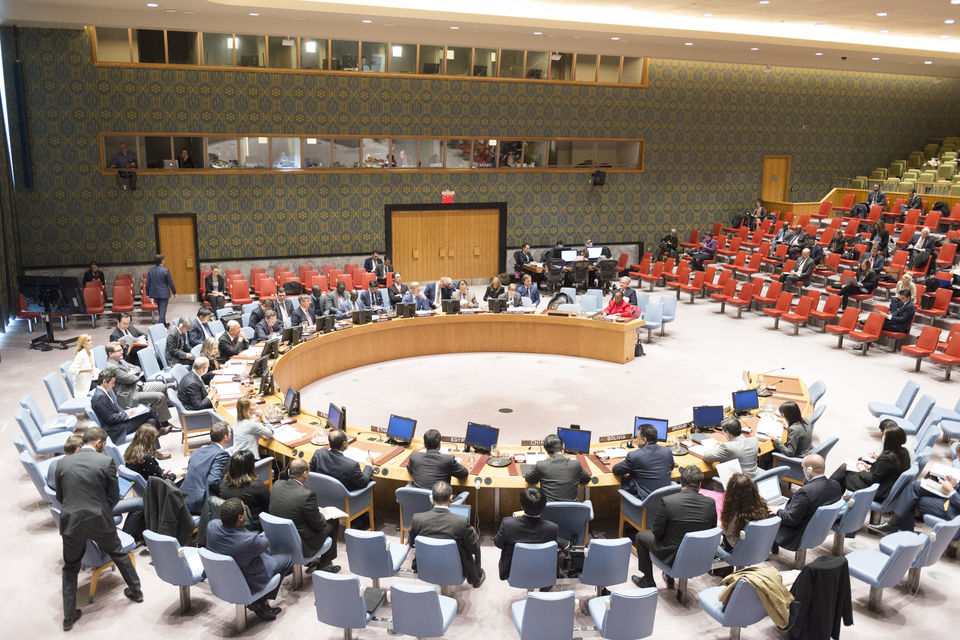Виступ делегації України на засіданні РБ ООН щодо діяльності іноземних бойовиків-терористів

As prepared. Check against delivery.
Mr. President,
I would like to start by thanking today’s briefers for their insightful and thought provoking presentations.
Three years ago, by adopting resolution 2178 this Council responded to the evolving phenomenon of foreign terrorist fighters, whose participation on the side of ISIL exacerbated conflicts in the Middle East.
As a result, around the world, many FTFs have been prevented from reaching Iraq and Syria, their recruitment and financing campaigns have been revealed and disrupted.
Yet, despite resolute measures, many extremists managed to infiltrate the region.
Now, due to constant military pressure by the international community, ISIL suffered significant losses and its so-called “caliphate” collapsed. Still this fight is far from over. We have repeatedly raised concerns about possible strategies this terrorist organization can choose to ensure its survival. Sadly, they all came true as ISIL accelerated the transfer of human and financial resources to its affiliates in other countries. Europe, North Africa as well as Central and South-East Asia have to face the inflow of returning or relocating FTFs.
The threat is more than real as these former ISIL fighters are ready to merge with any terrorist group should the opportunity arise and put to use lethal skills, acquired in Iraq and Syria. Their joining the fray of existing conflicts will only exacerbate the latter, increasing their complexity and duration.
Another side of this problem is a possible abuse of asylum systems by terrorists at the time when huge waves of migrants arrive from conflict zones in search of shelter. There is a growing concern over the creation of small sleeping cells in different parts of the world as well as potential preparation of signature “lone wolf” attacks. Terrorist strikes, which swept through Europe, are clear reflection of this.
Mr. President,
No country can be immune from this threat’s manifestations. That is why Ukraine is also actively working to ensure that all the necessary measures are taken domestically to counter this threat.
Over the past years, Ukraine has also acquired bitter experience of countering terrorist threat that has been fueled by external support for terrorist groups and organizations in the east of the country.
The operations conducted by the Security Service of Ukraine from 2015 until now led to the liquidation of logistical networks with 23 “transfer points” used for facilitation of travel of FTFs (natives of the Caucasus, Central Asia and Europe), en route through Ukraine and Turkey to the Syrian-Iraqi zone and back. Persons responsible for creating and maintaining transfer points were arrested and sentenced.
Bearing in mind that a relevant UN sanctions regime is a vital and effective tool against terrorism, Ukraine has also submitted respective listing requests to the UNSC 1267 Committee.
Mr. President,
To address changes in terrorists’ modus operandi we may consider adopting revised sophisticated measures to supplement Security Council resolution 2178 (2014). The reviews of its implementation show that combating potential threat from returning and relocating FTFs requires:
First, introducing advanced technologies for terrorists’ identification at border crossing points; running risk-assessment of most vulnerable border stretches to strengthen respective control. This cannot be accomplished without rapid sharing of information among states, especially of terrorists’ biometric data, as well as ensuring a broader use of advanced passenger information (API) and Interpol databases. In this regard, we welcome the decision of the ICAO to approve API as a universal standard and call on it to assist Member States in need to ensure its effective implementation.
Second, ensuring a wider criminalization of FTFs and conducting proper investigations of their crimes, so that terrorists are apprehended and do not escape justice. The support of affected countries in collecting credible evidence, as well as of the International, Impartial and Independent Mechanism for Syria and the newly created United Nations Investigative Team for Iraq is vital for these purposes.
Apart from that, proper caution is required in dealing with specific categories of returnees, in particular minors, women, family members and disillusioned returnees, who have committed less serious offences. In the cases, when it is not appropriate to bring terrorism-related charges, rehabilitation and reintegration programmes should be utilized.
Last but not the least, countering the radicalization threat from those who returned. Some of them are coming back battle-hardened, strongly indoctrinated and with newly forged ties with extremist groups. Therefore, states should focus on implementing nuanced measures in line with the SG’s Plan of Action on Preventing Violent Extremism and SC’s resolution 2354 on Countering Terrorist Narratives.
Mr. President,
Implementing respective measures require concerted and harmonized actions by the whole international community. That is why the international cooperation at the regional and global levels between respective law-enforcement and intelligence agencies is mandatory. Without it, any national efforts will be futile.
Further development and dissemination of good practices in preventing the flow of FTFs are also crucial in dealing with this phenomenon. In this regard, we support the work being done by the UN Office of Counter-Terrorism, as well as Counter-Terrorism Committee with its Executive Directorate in assisting and facilitating Member States to strengthen their respective capacities.
I thank you.
